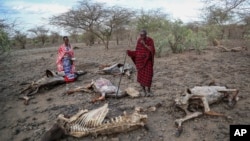Communities across Africa are facing the worst food crisis in 40 years. Conflict, economic shocks, climate extremes and rising prices of fertilizer and food stuffs are combining to create a crisis of unprecedented proportions. According to the Red Cross, some 160 million Africans go to bed hungry nearly every night.
The Horn of Africa is at the intersection of all of these challenges, said United States Permanent Representative to the United Nations, Linda Thomas-Greenfield. “Increasing fuel prices, combined with both a historic dry spell and devastating flooding, compounded by brutal civil conflict, and worsened by Russia’s blockade of Ukrainian grains and fertilizer, have created a five-alarm food security crisis.” And the situation is increasingly more dire, she said.
“And I am proud that the United States has provided more than 1.4 billion in aid across the Horn of Africa in the last year dollars alone. And that we are the world’s largest single donor of international food assistance, helping more than 60 million hungry people in nearly 60 countries around the world.”
Food aid and other humanitarian assistance are all well and good, but they’re not enough. “We need to invest in renewable energy; to sow the seeds of peace in areas of intense conflict; and to partner across governments, between people, and with the private sector,” said Ambassador Thomas-Greenfield.
And we need programs that help Africans to help themselves, to grow their own food. That’s where the Vision for Adapted Crops and Soils, or VACS, comes in. A collaborative effort between the U.S. Government, the African Union and the UN’s Food and Agriculture Organization, VACS seeks to adapt agricultural systems, initially in Africa, to the future challenges of climate change. VACS focuses on the development of climate-resilient seeds, often those of traditional crops; and improvement of soil health, to boost agricultural production and to foster more resilient food systems.
“From developing healthy, sustainable soils and diverse, climate-resilient crops, to empowering farmers, policy makers, and suppliers, this initiative will make Africa’s food system more productive, more cost-effective, and more resilient,” said Linda Thomas-Greenfield.
“Millions of lives are at stake. And global security is at stake, too. Because we know that while conflict is the number one driver of hunger, hunger is also a core indicator of conflict. And so, this crisis has to be at the top of all of our agenda.”






